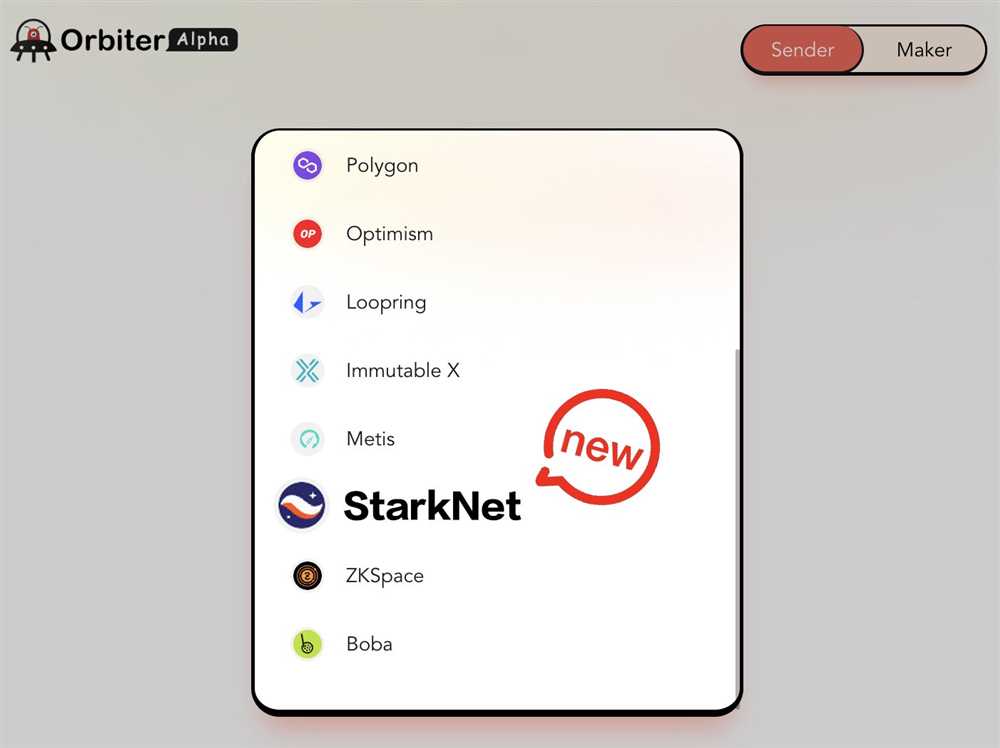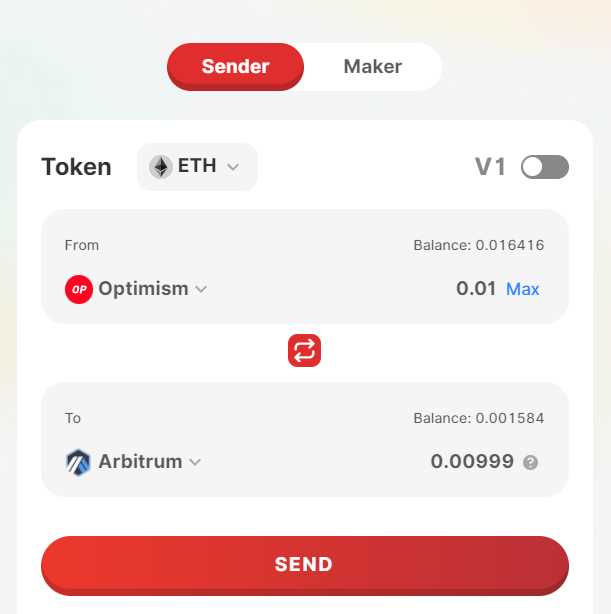
Planning for Gas Fees in Orbiter Finance: Budgeting for Cross-Chain Transactions

Orbiter Finance is revolutionizing the way we transact on the blockchain, bridging different chains to provide seamless cross-chain transactions. However, when using Orbiter Finance for your transactions, it’s important to be aware of the gas fees involved.
Gas fees are the costs associated with executing smart contracts on the Ethereum network. They are paid in ETH and are required for any transaction to be processed. Since Orbiter Finance operates on the Ethereum network, gas fees apply to cross-chain transactions as well.
Planning and budgeting for gas fees can help you optimize your transactions and ensure that you have enough ETH to cover the costs. Here are a few tips to help you budget for gas fees:
1. Estimate gas costs: Before making a cross-chain transaction on Orbiter Finance, estimate the gas costs using tools like Etherscan or GasNow. This will give you an idea of how much ETH you will need to allocate for the transaction.
2. Set a gas price limit: Gas prices can fluctuate depending on network congestion. Set a maximum limit for the gas price you are willing to pay to avoid overspending. This will help you control your gas fees and stay within your budget.
3. Consider off-peak times: Gas fees are typically lower during off-peak times when network traffic is lower. Consider making your transactions during these times to save on gas fees.
4. Optimize your transactions: Look for opportunities to optimize your transactions and reduce gas costs. For example, you can batch multiple transactions into a single transaction or use a different chain with lower gas fees if supported by Orbiter Finance.
By following these tips, you can effectively budget for gas fees in Orbiter Finance cross-chain transactions and make the most out of your transactions.
Plan

Creating a budget for gas fees in your Orbiter Finance cross-chain transactions is essential to ensure a smooth and cost-effective experience. Here is a step-by-step plan to help you manage your expenses:
| Step | Description |
|---|---|
| 1 | Evaluate your transaction needs |
| 2 | Research gas fees for different networks |
| 3 | Estimate gas fees for your specific transactions |
| 4 | Set a maximum budget for gas fees |
| 5 | Monitor gas prices and adjust your budget if necessary |
| 6 | Optimize transaction timing to take advantage of lower gas prices |
| 7 | Consider using gas fee estimation tools |
| 8 | Track your gas fee expenses and adjust your budget accordingly |
| 9 | Review and refine your budgeting strategy regularly |
By following this plan, you can ensure that you have a clear understanding of your gas fee expenses and make informed decisions to optimize your cross-chain transactions in Orbiter Finance.
Understanding Gas Fees

Gas fees are a crucial aspect of any cross-chain transaction in Orbiter Finance. In order to fully understand gas fees, it is important to grasp their purpose and how they affect your transactions.
Gas fees are essentially the transaction costs on the blockchain network. They are required to incentivize and prioritize your transaction, as well as to prevent spam and abuse. Gas fees are paid in ETH (Ethereum) and vary depending on network congestion and the complexity of the transaction.
The gas fees for a transaction are calculated based on two factors: the amount of computational work required to execute your transaction and the current gas price on the network. The more complex the transaction or the higher the gas price, the higher the gas fees will be.
When you initiate a cross-chain transaction in Orbiter Finance, you need to carefully consider the gas fees. It is important to budget for these fees to ensure a smooth and cost-effective transaction. Failing to allocate enough gas fees may result in your transaction getting stuck or delayed.
To budget for gas fees, you should monitor the gas prices on the network and estimate the gas consumption of your transaction. This can be done by using tools such as gas price trackers and Ethereum gas calculators. By staying informed about the current gas fees and gas prices, you can make informed decisions and optimize your transaction costs.
In conclusion, understanding gas fees is vital when using Orbiter Finance for cross-chain transactions. By carefully budgeting for gas fees and staying informed about gas prices, you can ensure efficient and cost-effective transactions on the blockchain network.
Factors Affecting Gas Fees
Gas fees are an essential aspect of cross-chain transactions and play a significant role in determining the cost and efficiency of conducting transactions on Orbiter Finance. Several factors can influence the gas fees associated with these transactions:
Network Congestion

Network congestion refers to the level of activity and demand within a blockchain network. When the network is congested, more transactions are being processed simultaneously, resulting in limited resources and increased competition for block space. As a result, gas fees tend to rise during periods of high network congestion.
Gas Price

The gas price, measured in gwei, determines the amount of cryptocurrency or token paid for each unit of gas consumed during a transaction. Gas prices can fluctuate based on various factors such as market demand, network activity, and miner incentives. Higher gas prices typically result in faster transaction confirmation but can increase the overall cost.
Transaction Complexity

Transaction complexity refers to the computational resources required to execute a transaction on the blockchain. Complex transactions that involve multiple contract interactions, calculations, or data manipulations generally consume more gas and, consequently, have higher gas fees. Simple transactions, on the other hand, consume fewer resources and attract lower gas fees.
Gas Limit

The gas limit establishes the maximum amount of gas that can be used for a transaction. Gas limits are typically set by the user or wallet initiating the transaction. If a transaction exceeds the set gas limit, it fails and is reverted, resulting in wasted gas fees. Setting an appropriate gas limit that accommodates the transaction’s computational requirements is crucial to avoid unnecessary costs.
Understanding these factors and effectively budgeting for gas fees can help users navigate the dynamic gas fee landscape and optimize their cross-chain transactions on Orbiter Finance.
Tips to Budget for Gas Fees

Gas fees are an essential consideration when transacting on the Orbiter Finance platform. To ensure you can complete your cross-chain transactions seamlessly, it is important to budget for gas fees effectively. Here are some tips to help you do so:
| Tips | Description |
|---|---|
| 1. Plan your transactions | Before initiating any transaction, carefully plan the steps involved and estimate the gas fees required. This will help you have a clear understanding of the costs involved and allocate the necessary funds accordingly. |
| 2. Monitor gas prices | Gas prices can fluctuate depending on network congestion and demand. Stay updated on the current gas prices in order to optimize your transactions. Consider executing your transactions during periods of low gas prices to minimize costs. |
| 3. Optimize gas usage | Take advantage of gas optimization techniques to reduce the overall gas fees. This can include utilizing contract interactions that consume less gas or leveraging time-saving smart contract functions. |
| 4. Consider batch transactions | If you have multiple transactions to execute, consider batching them together. By consolidating your transactions, you can reduce the gas fees associated with each individual transaction and optimize your overall costs. |
By following these tips, you can effectively budget for gas fees and ensure a smooth experience with Orbiter Finance cross-chain transactions. Remember to stay updated on gas prices and optimize your transactions to minimize costs.
Maximizing Efficiency in Cross-Chain Transactions

When engaging in cross-chain transactions, it is crucial to maximize efficiency to ensure smooth and cost-effective transfers. Here are some key strategies to consider:
1. Choose the Right Chains:
Start by selecting the most suitable blockchain networks for your transaction needs. Consider factors such as transaction fees, transaction speed, and network congestion. Opting for chains with lower fees and faster confirmation times can significantly enhance efficiency.
2. Utilize Layer 2 Scalability Solutions:
Layer 2 solutions like Orbiter Finance can provide significant efficiency boosts by offloading transaction volume from the main blockchain. By leveraging layer 2 solutions, you can reduce gas fees and eliminate congestion-related delays, allowing for faster and cost-effective cross-chain transactions.
3. Optimize Gas Fee Budgeting:
Take time to estimate and allocate the appropriate gas fee budget for your cross-chain transactions. Research the average gas fees on the chosen networks and consider allocating a slightly higher budget to account for potential fluctuations. This will help prevent transaction failures and ensure that your transactions are processed reliably and swiftly.
4. Monitor Gas Fee Trends:
Stay informed about the latest gas fee trends on different blockchains. Gas fees can vary significantly depending on network activity and demand. By keeping track of gas fee trends, you can time your transactions to minimize costs and maximize efficiency.
5. Consider Batch Transactions:
If you have multiple cross-chain transactions to execute, consider bundling them into a single batch transaction. By doing so, you can optimize gas fees and reduce overall costs. However, be mindful of any limitations or restrictions imposed by the chosen blockchain networks.
By implementing these strategies, you can maximize efficiency in your cross-chain transactions, ensuring seamless transfers while minimizing costs. Remember to stay up-to-date with the latest developments and advancements in blockchain technology to continuously improve your transaction processes.
Q&A:
What are gas fees in Orbiter Finance cross-chain transactions?
Gas fees in Orbiter Finance cross-chain transactions are the fees required to process and validate transactions on the blockchain. These fees are paid to the network of validators and miners who maintain the network and ensure its security.
How can I budget for gas fees in Orbiter Finance cross-chain transactions?
To budget for gas fees in Orbiter Finance cross-chain transactions, you should consider the current gas prices on the blockchain network you are using. Gas prices can fluctuate based on network congestion and demand. You can use gas price trackers or check the transaction history to get an idea of the current prices. Once you have an estimate of the gas fees, you can allocate a portion of your budget to cover these fees.
Can I reduce the gas fees in Orbiter Finance cross-chain transactions?
While you cannot directly reduce the gas fees in Orbiter Finance cross-chain transactions, there are some strategies you can use to optimize your transactions and potentially save on fees. These include batching your transactions, using the appropriate gas limit, and timing your transactions during periods of low network congestion. Additionally, you can also explore alternative blockchain networks that may have lower gas fees.
What happens if I don’t budget enough for gas fees in Orbiter Finance cross-chain transactions?
If you don’t budget enough for gas fees in Orbiter Finance cross-chain transactions, your transaction may fail to process or be stuck in a pending state. In such cases, you may need to resend the transaction with a higher gas fee or wait for the network congestion to decrease before your transaction can be processed. It’s important to budget enough for gas fees to ensure smooth and timely transaction processing.


